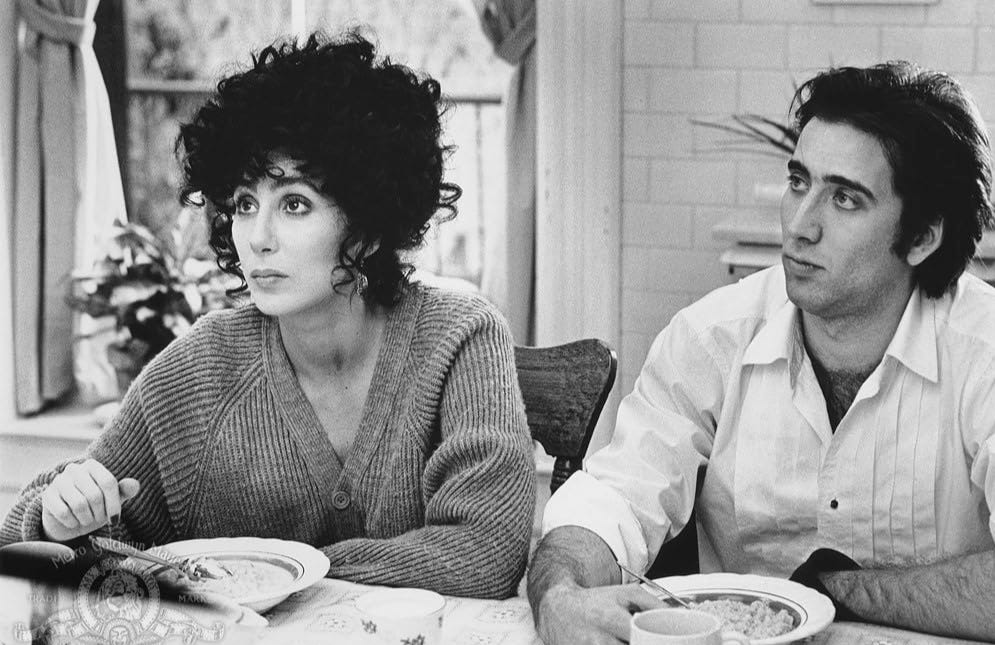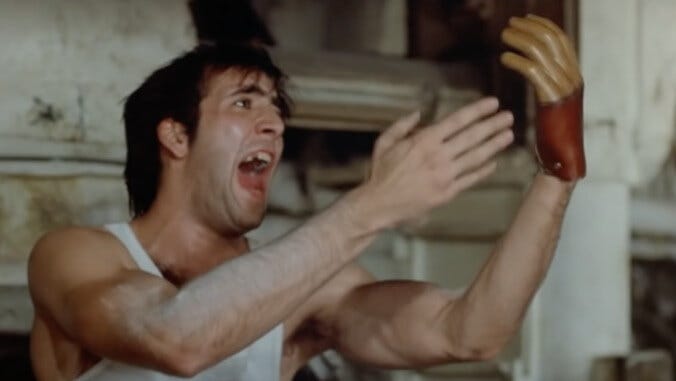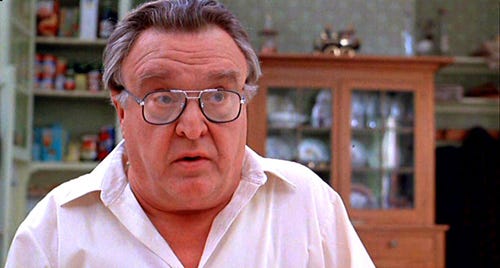Here’s a post based on this week’s episode of Fifteen-Minute Film Fanatics, a podcast that often breaks the promise of its title but never wastes the listener’s time. The post and the podcast complement each other. We take requests, so leave a comment below if there’s a film you’d like us to cover. We’ve done over three hundred episodes that you can find on Spotify, Apple, or wherever you get your podcasts. Check out the back catalogue for episodes on your favorite films—or give us some you’d like us to cover. Please subscribe and listen wherever you get your podcasts and consider leaving a review on your platform of choice. Thanks.
When I was a kid in the early 70s, my mother’s friend had this T-shirt:
I never understood it. It bothered me somehow. It didn’t make any sense. Why would a fish even want a bicycle? Of course, now I get the joke, although it’s not really that funny. It’s like a sticker for the back of a Subaru more than a reasoned position on human relationships; swap the sexes and it still denies the reality of one of the most powerful forces in nature, a force more powerful than the ionic bonds holding nature together.
Moonstruck is a dramatization—and celebration—of that force. Norman Jewison’s 1987 film denies the major premise of the T-shirt in a comic way and instead makes a case for what God says in Genesis: “It is not good that the man should be alone.” As with the T-shirt, substitute the sexes here and you get the same idea. Sartre was wrong: hell is not other people. Hell is life without them.
Loretta (Cher) isn’t ready for that T-shirt, but she has decided that real, moonstruck, lunatic love is for other people. A widow who has found an acceptable yet unexciting second chance, she lives in self-imposed exile from the world of romance. Ronny, her fiancée’s brother-in-law (Nicholas Cage), is another exile: shoveling coals into a subterranean furnace all day with his wooden hand, he’s an incomplete man, stewing in a Hell of his own making. Both of them are resigned to what they see as their unalterable fates. Things are easier that way: they don’t have to expose any vulnerabilities and can play it safe. They know their lines, but the universe decides to change the script. That’s when the movie begins.
When Rose (Olympia Dukakis) asks Johnny (Danny Aiello), her would-be son-in-law, “Why do men chase women?” she acts like she doesn’t know the answer, but she does. Everybody knows it: there’s an attraction between people that can’t be denied. That attraction, that force, turns people into lunatics—literally, those made temporarily insane because of the moon—regardless of how willful, old, or self-deluded they might be. The viewer feels the pull of this force, as well. Who can watch Ronny’s impassioned speech to Loretta after the opera and not want her to go to his room? Who can watch without a smile the scene in which the older couple—Rita and Raymond—find themselves rekindled by “Cosmo’s moon?” Even Perry (John Mahoney), in his endless pursuit of what he calls "beautiful young faces” is a fool more than a cad. Yet Rose, the moral center of the film, never condemns him during their unexpected dinner, nor does the film scorn mock any of its characters for their own strains of lunacy, their failures and flaws.
This lack of scorn raises the point that, like so few other films, Moonstruck takes the idea of Catholicism seriously without ever becoming tendentious. Catholic tenets, like incense, suffuse the film. Watching Moonstruck is like reading the work of Flannery O’Connor: the characters aren’t a group of priests, nuns, or holy people, but their confusion and struggles dramatize Catholic ideas. Jesus is visually everywhere in the movie—backroom cork-boards, china cabinets, home decor—as well as in the characters’ actions. When, in the film’s climax, Rose tells Cosmo, her wayward husband (Vincent Gardina), that she knows about his affair, she says (in front of the family, all seated around them at the kitchen table), “I want you to stop seeing her.” He stands, slams the table like Ralph Kramden trying to assert his authority, and then sits down with, “OK.” Her last word on this—“And go to confession”—is automatic and axiomatic: she detests the sin but not the sinner. He may feel sorry and express this to her, even in a simple, “OK,” but he also has to repent to a priest. She doesn’t want to humiliate or punish him; she wants him to get right with God.
When, in A Midsummer Night’s Dream, Theseus states, “The lunatic, the lover, and the poet / Are of imagination all compact,” he assumes, like Loretta and Ronnie, he is immune to the fancies that affect each of these types. Of course, he isn’t: like many Shakespearian know-it-alls, he finds himself in a new space (the moonlit Athens, the Forest of Arden, the coast of Illyria, Baptista’s house in Padua) that changes his seemingly ironclad assumptions about love. When Loretta decides, seemingly on a whim, to remove the grey from her hair and buy an evening dress and Ronnie dusts off his tux for the opera, they are each opening themselves up to the possibility that they were wrong about themselves. To open themselves to the possibility of love seems crazy, but what’s crazy is insisting on being closed off. The moonlit world is not an escape from the real world; it is the real world. Going back to work on Monday isn’t as real as what we feel when we are struck by the light of the moon. That’s amore.
The old man who walks his dogs sees the sky and exclaims, “La bella luna! The moon brings the woman to the man. Capisci?” he may as well be Shakespeare or screenwriter John Patrick Shanley nudging the audience.
Moonstruck could never be made today, not because of its complexity but because of its simplicity. If it were remade (and, considering the dearth of new material, a remake is probably in the works), the ensemble would be composed of characters with an array of hip hangups, the Catholic element would be gone, the treatment of Loretta’s plight would be more condemnatory to give critics a ready-to-go handle about how the film “skewers the patriarchy,” and there would be much hand-wringing over her “agency.” It would be billed as comedy, but also be essentially humorless, and the director would try to make Loretta wear (literally or figuratively) that 70s T-shirt in the final scene.
Gloria Steinem is credited for the “fish without a bicycle” line, but she adapted a quip from filmmaker and activist Irene Dunn, who said, “A man needs God like a fish needs a bicycle.” According to Moonstruck, both of them are wrong. We’re all fish who should learn how to work the pedals.
Listen to the episode on Spotify, Apple, or wherever you get your podcasts. And as a PS, here’s the great Bobby Short singing, “Hooray for Love,” which pairs perfectly with the movie. I dare anyone to listen to this and remain a grouch.







